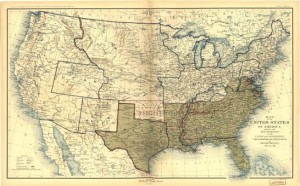 Today, Union Gen. Ulysses S. Grant, recently named commander of the District of West Tennessee, launches the Vicksburg Campaign, a Union offensive to seize total control of the Mississippi River by capturing the fortified river city of Vicksburg, Mississippi. It will be months before Grant reaches Vicksburg, but the campaign will prove to be one of the most important of the war.
Today, Union Gen. Ulysses S. Grant, recently named commander of the District of West Tennessee, launches the Vicksburg Campaign, a Union offensive to seize total control of the Mississippi River by capturing the fortified river city of Vicksburg, Mississippi. It will be months before Grant reaches Vicksburg, but the campaign will prove to be one of the most important of the war.
This month, members of the Stamford Baptist Church, Connecticut, listen to a political sermon by Dwight K. Bartlett, a Presbyterian clergyman, delivered in the Baptist church during a “union meeting” of the city’s Protestant congregations.
Bartlett’s sermon is entitled, “The Philosophy of the Rebellion.” U. S. President Abraham Lincoln‘s recent Preliminary Emancipation Proclamation is uppermost in the minds of the Baptists and others present in the service.
An excerpt of Bartlett’s sermon is as follows:
The South refuses to educate the slave, not because she hates him; she denies his right as a legal witness, not to cover the atrocities of the master; but to give him culture, or any privileges which would recognize his manhood, would overturn her whole civilization. To teach a slave to read, to admit his testimony in court, to respect his marriage, to prefer the right of the father over that of the master, to allow to him liberty of conscience, would involve a revolution whose issue would be a destruction of the institution. And this is the vice which imparts to Southern slavery its essential criminality. Not that it is involuntary servitude, but that it only exists by and through a repudiation of all the natural rights of man. Educate a slave, and you cannot hold him. Tell him that he is a man, with God-given rights, and at once the fetters will begin to spring. Regard the wife of his bosom and the children he has begotten, and the whole edifice of Southern society will begin to crumble. It is often remarked, `Don’t preach against slavery, but its abuses.’ Why, it is the abuses by which it is sustained! Remove the abuses, and no power of man can prevent the institution from perishing.
As 1862 draws to a close, anti-slavery sermons similar to Bartlett’s are increasingly preached in the pulpits of Baptist congregations of the North.
Source: Michael B. Ballard, Vicksburg: The Campaign that Opened the Mississippi, University of North Carolina Press, 2010 (link); Dwight K. Bartlett, Philosophy of the Rebellion, A Sermon Delivered in the Baptist church, Stamford, Conn., Before the Union Church Meeting, by the Rev. Dwight K. Bartlett, Albany, NY: Weed, Parsons and Company, 1864 (link) and (link)


